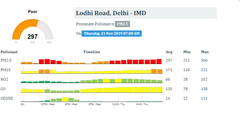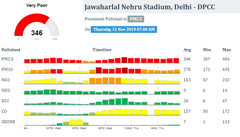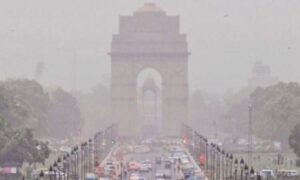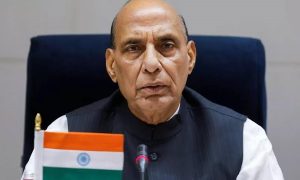Delhi’s air quality remained in the “very poor” category for the second day on Thursday as the wind speed slowed down in the region and is likely to deteriorate in the next two days,
According to data provided by the Central Pollution Control Board (CPCB), the air quality index (AQI) of the national capital rose to 354 on Thursday morning from 301 on Wednesday — both in the “very poor” category.
The AQI value for Tuesday was 242, which was in the “poor” category.
An AQI between 201 and 300 is considered “poor”, 301-400 “very poor” and 401-500 “severe”, with the last category dangerous for the health of vulnerable people such as children and the elderly.
Experts said changing weather conditions and slowing down of the speed of winds in the region have contributed to the deteriorating air quality in the Capital.
The weather scientists also forecast that the air quality to further worsen during the day.


A parliamentary standing committee met on Wednesday to take stock of the measures taken and possible options for reducing air pollution.
According to lawmakers present in the meeting, the Centre told the panel that it wants to convert all commercial vehicles to CNG in future, replace thermal-based plants by gas-based plants and not allow industries in specified areas.
Officials said that out of Rs 300 crore given for pollution control, Rs 146 crore had already been released for Delhi.
A discussion on pollution also took place in the Lok Sabha for the second straight day as the Congress accused the governments at the Centre and in Delhi of turning the national capital from the “greenest” to “most polluted in the world” in the last five years.
It is likely to conclude on Thursday.
The Supreme Court-mandated Environment Pollution (Prevention and Control) Authority had earlier this week warned Delhi’s air quality may deteriorate to “severe” zone on November 21-22 because of unfavourable weather conditions and a higher share of pollutants from crop stubble burning in neighbouring states.
Experts said the deterioration defies usual trends – when the air quality begins improving by the third week of November – and is caused because of a long-drawn monsoon that has delayed the harvesting of paddy.
Scientists at the India Meteorological Department (IMD) said Delhi has already seen three western disturbances this November and a fourth one is approaching on November 23.
All the three western disturbances so far were weak and brought clouds but only scant rain, which in turn trapped pollutants.




























 WhatsApp us
WhatsApp us